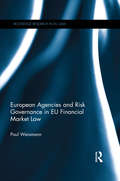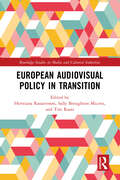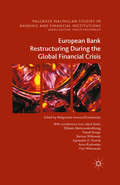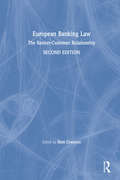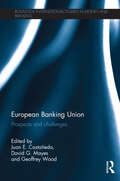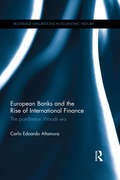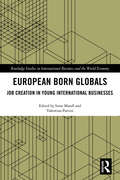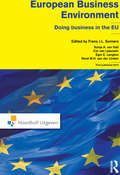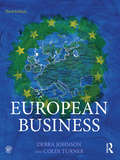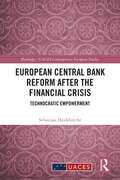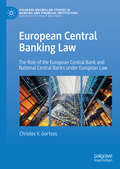- Table View
- List View
European Agencies and Risk Governance in EU Financial Market Law (Routledge Research in EU Law)
by Paul WeismannThe phenomenon of ‘agencification’ describes the EU legislator’s increasing establishment of European agencies to fulfil tasks in a variety of EU policies. The creation of these decentralised administrative entities raises a number of questions; for example, on the limits to such delegation of powers, on the agencies’ institutional development and possible classification, and on the role of comitology committees as an institutional alternative. This book examines the EU’s ‘agencification’ with regard to these questions, on the basis of and with reference to which the focus is laid on the European agencies operating in the field of financial market risk governance. This analysis not only encompasses the three European Financial Market Supervisory Authorities (the ESAs), but also takes into account the institutional change brought about by the Banking Union, more specifically the Single Supervisory Mechanism (SSM) and the Single Resolution Mechanism (SRM). While the SRM sets in place a new European agency, the Single Resolution Board (SRB), the SSM establishes and empowers a new body within the organisation of the European Central Bank (ECB), the Supervisory Board. By exploring the organisation, the tasks and the powers of these actors in financial market regulation and supervision, the book points at the current peak of the institutional development of European agencies and assesses organisation and unprecedented powers with a view to their compliance with EU law, in particular the Treaties and the respective case law of the European courts. As an evaluation of various aspects of the progressing centralisation of regulatory power on the EU level, which is exercised by an increasingly decentralised administrative apparatus, this book will be of great interest and use to students and scholars of EU law, financial law and regulation, and European politics.
European Agricultural Policy: History and Analysis
by Gianluca Brunori Franco SotteThis book presents the European Common Agricultural Policy by tracing its crucial stages from its conception to the present days. It reconstructs the negotiating processes that have taken place at the political and institutional level over the years. At the same time, the book brings together the results of analyses made by agricultural policy scholars to propose solutions, and to evaluate the policies adopted and the results they produced. The book takes on a twofold objective: to understand how many of today’s problems have roots whose branches extend back in time, and to draw, from the lessons of history, useful insights for endowing the European Union with an ambitious agricultural and rural development policy, suited to the challenges ahead.
European Armaments Collaboration: European Armaments Collaboration: Policy Problems And Prospects (Routledge Studies in Defence and Peace Economics #1)
by Ron MatthewsFirst published in 1992. The changing strategic environment of the 1990s has been characterised by events such as the Middle-East conflagration and super-power disarmament which represent the two opposing ends of the present security spectrum. The framing of appropriate defence policies now depends on increased NATO industrial defence restructuring and cooperation, especially within Europe. This book identifies, explains and analyses the key issues involved in Europe's defence-industrial reorganisation progress. It tackles head-on controversial issues such as: divergences between practice and policy in NATO US-European positions; the high costs of collaborative ventures; competition vs concentration and the complexities of adopting an European defence consensus within NATO. At a time when the diminution of NATO's defence-industrial base goes hand-in-hand with product reorientation and specialization, this book provides concise, critical and contemporary assessment of European and NA TO collaborative issues.
European Audiovisual Policy in Transition (Routledge Studies in Media and Cultural Industries)
by Heritiana Ranaivoson Sally Broughton Micova Tim RaatsThis book describes and critically addresses the innovations and shifts made in the revision of the Audiovisual Media Services Directive (AVMSD) adopted by the European Parliament and Council in 2018. Reflecting on European Union regulation and policy practice in all its Member States, the book’s unique approach places in-depth case study topics against the broader theoretical background. Taking a Europe-wide angle, an international team of authors focuses on key aspects of the AVMSD: the expansion of its scope to include video-sharing-platforms such as YouTube; the update of the rules for commercial communications; the first attempt for harmonized, minimal requirements at EU level regarding transparency of media ownership; new rules to ensure that video-on-demand services offer, invest in, and prioritise European content; the obligation on television distributors and smart TV manufacturers to pass on broadcasters’ signal without any interference, alteration or modification; and, the formalisation and consolidation of new forms of collaboration among national regulatory authorities. This thorough analysis of the cornerstone of European media policy makes this edited collection a crucial reference for scholars and students of media and cultural industries, media law and policy, European and EU media policy, and technology studies.
European Bank Restructuring During the Global Financial Crisis (Palgrave Macmillan Studies in Banking and Financial Institutions)
by Jakub Kerlin Paweł Smaga Bartosz Witkowski Anna Kozłowska Elżbieta Malinowska-Misiąg Agnieszka K. Nowak Piotr WiśniewskiThis book explores the diversity of restructuring instruments applied to financial institutions in EU countries during the Global Financial Crisis. It investigates the cost of that support before evaluating its effects, as well as providing an extensive analysis of the measures undertaken. The first chapter presents a historical outline, discusses causes of crises, and offers an overview of the restructuring instruments and of how they were used for crisis management before 2007. The following chapters explore the financial environment in the EU before the crisis outbreak, the rescue actions and financial landscape after the events of the crisis. This book offers a critical and thorough analysis of the financial support provided to banks, providing case studies of over 95 banks from 17 EU member states. The authors provide an in-depth study of the pre and post-crisis landscape, and demonstrate that the crisis has by no means been overcome.
European Bank Restructuring During the Global Financial Crisis (Palgrave Macmillan Studies in Banking and Financial Institutions)
by Jakub Kerlin Małgorzata Iwanicz-Drozdowska Paweł Smaga Bartosz Witkowski Anna Kozłowska Elżbieta Malinowska-Misiąg Agnieszka Nowak Piotr WisniewskiThis book explores the diversity of restructuring instruments applied to financial institutions in EU countries during the Global Financial Crisis. It investigates the cost of that support before evaluating its effects, as well as providing an extensive analysis of the measures undertaken. The first chapter presents a historical outline, discusses causes of crises, and offers an overview of the restructuring instruments and of how they were used for crisis management before 2007. The following chapters explore the financial environment in the EU before the crisis outbreak, the rescue actions and financial landscape after the events of the crisis. This book offers a critical and thorough analysis of the financial support provided to banks, providing case studies of over 95 banks from 17 EU member states. The authors provide an in-depth study of the pre and post-crisis landscape, and demonstrate that the crisis has by no means been overcome.
European Banking Law: The Banker-Customer Relationship
by Ross CranstonThis text presents a practical analysis of the private law of banking transactions. Rooted in contract, the banker-customer relationship is overlaid with a range of rights and obligations having their derivation in tort, delict, notions of equity, good faith and statute. The book looks at some questions that arise within the banker-customer relationship in various European jurisdictions. What are the nature and consequences of the banker-customer relationship? Is there a duty on banks to advise customers and others about particular dealings and what liability arises if any advice given is wrong? What security can a bank take to protect itself as lender?
European Banking Nationalism: State Power and Troubled Banks (Routledge/UACES Contemporary European Studies)
by Shawn Donnelly Gaia PomettoThis book compares the different expressions of, and outcomes from, banking nationalism in two European countries to draw wider conclusions about the consequences for Banking Union in Europe and to show how national governments deal (or fail to deal) with international commitments. It reveals how and why one case – Spain – managed to tackle failing banks within EU Banking Union regulations even before they became written in EU law, while the other – Italy – had more persistent problems. The book argues that Spain demonstrates a successful case of liberal economic nationalism, typified by aggressive, early state intervention to restructure Spanish banks, and help from the European Stability Mechanism even in the face of local political opposition. Italy, meanwhile, suffered from the weaker, delayed intervention which forced it to confront European institutions with demands for special treatment as a means of externalizing its own internal weakness. This book will be of key interest to scholars, students and professionals in economic policy, Economic and Monetary Union and Banking Union in Europe, European and global governance, European/EU studies, European public policy, European public administration and EU law, as well as professionals working in the banking sector.
European Banking Union: Prospects and challenges (Routledge International Studies in Money and Banking)
by Geoffrey Wood David G. Mayes Juan E. CastañedaRecent failures and rescues of large banks have resulted in colossal costs to society. In wake of such turmoil a new banking union must enable better supervision, pre-emptive coordinated action and taxpayer protection. While these aims are meritorious they will be difficult to achieve. This book explores the potential of a new banking union in Europe. This book brings together leading experts to analyse the challenges of banking in the European Union. While not all contributors agree, the constructive criticism provided in this book will help ensure that a new banking union will mature into a stable yet vibrant financial system that encourages the growth of economic activity and the efficient allocation of resources. This book will be of use to researchers interested in Banking, Monetary Economics and the European Union.
European Banking and Financial Law
by Matthias Haentjens Pierre de Gioia-CarabelleseIn recent decades, the volume of EU legislation on financial law has increased exponentially. Banks, insurers, pension funds, investment firms and other financial institutions all are increasingly subject to European regulatory rules, as are day to day financial transactions. Serving as a comprehensive and authoritative introduction to European banking and? financial law, the book is organized around the three economic themes that are central to the financial industry: (i) financial markets; (ii) financial institutions; and (iii) financial transactions. It covers not only regulatory law, but also commercial law that is relevant for the most important financial transactions. It also explains the most important international standard contracts such as LMA loan contracts and the GMRA repurchase agreements. Covering a broad range of aspects of financial law from a European perspective, it is essential reading for students of financial law and European regulation.
European Banking and Financial Law 2e
by Matthias Haentjens Pierre de Gioia CarabelleseOver the last few decades, banks, insurers, pension funds, investments firms and other financial institutions have become subject to sometimes dramatically new, but always substantially more, legislation. This is especially true for the EU. Moreover, Brexit has already caused profound changes to the dynamics of EU financial regulation, and its effects will likely become ever-more significant in the years to come. This book serves as a comprehensive introduction to these developments, and, more generally, to European banking and financial law. It is organised around the three economic themes that are central to the financial industry: (i) financial markets, (ii) banking and financial institutions and (iii) financial transactions. It covers not only regulatory law but also commercial law that is relevant for the most important financial transactions. This Second Edition has been completely revised. The basic structure of the First Edition has been maintained, but all chapters have been thoroughly rewritten and restructured. Attention is now also given to topics such as shadow banking and credit rating agencies. As a matter of course, all new relevant legislation and case law has been included. In addition, on the basis of real-life classroom experience, student questions and further reading suggestions have been updated and expanded.
European Banking and Financial Law Statutes
by Matthias Haentjens Pierre de Gioia CarabelleseEuropean Banking and Financial Law Statutes presents all the key legislation for European banking and financial law in one student-friendly volume. This book is: • up-to-date with the law: based on the official consolidated texts of all relevant European instruments, this book provides a fully current collection of legislation • tailored to course outlines: content has been curated to align with European banking and financial law courses • exam friendly: conforming to regulations, this is an un-annotated text that is suitable for exam use • easy to use: a clear and attractive text design, detailed table of contents and multiple indices provides ease of reference and navigation. Ideal for course and exam use, as well as for reference, this book is a perfect companion resource for student learning and exam success, which is especially tailored for use in combination with the European Banking and Financial Law textbook.
European Banks and the Rise of International Finance: The post-Bretton Woods era (Routledge Explorations in Economic History #No. 101)
by Carlo Edoardo AltamuraThe banking and financial sector has expanded dramatically in the last forty years, and the consequences of this accelerated growth have been felt by people around the world. European Banks and the Rise of International Finance examines the historical origins of the financialised world we live in by analysing the transformations in world finance which occurred in the decade from the first oil crisis of 1973, until the debt crisis of 1982. This a crucial and formative decade for understanding the modern financial landscape, but it is still mostly unexplored in economic and financial history. The availability of new archival evidence has allowed for the re-examination of issues such as the progressive privatisation of international financial flows to Less Developed Countries, especially in Latin America and South-East Asia, and its impact on the expansion of the European banking sector, and for the development of an invaluable financial and political history. This book is well suited for those interested in monetary economics and economic history, as well as those studying international political economy, banking history and Financial history.
European Born Globals: Job creation in young international businesses (Routledge Studies In International Business And The World Economy Ser.)
by Irene MandlIn the aftermath of the global recession, job creation is a policy priority. While it is a well-accepted fact that the majority of jobs are created by small and medium-sized enterprises, not all SMEs are rapidly growing, or even intend to expand. With limited public budgets, business models within the SME population that do show high job creation potential become very attractive. One of the business types identified as major engines of job creation are ‘born globals’ characterised as firms which engage intensively in internationalisation activities shortly after start-up. They are high on the entrepreneurship research agenda but so far little attention has been devoted to their potential as job creators, the processes they apply when hiring and the barriers they face. Through a combination of secondary data analysis, literature reviews and international case studies, European Born Globals sheds new light on the motivations and processes of job creation in born global firms. It will contribute to understanding the ‘why’ and ‘how’ of job creation in born globals, essential not only for policy makers, but also for academic research and management education.
European Business Environment: Doing Business in Europe (Routledge-Noordhoff International Editions)
by Frans SomersDoing business in Europe is increasingly becoming an everyday reality for many companies, not only large corporations, but also small and medium-sized enterprises. European Business Environment offers students a practical introduction to how to create, manage and develop business opportunities in the European Union. Taking a multidisciplinary approach to doing business in the EU, this textbook focuses on the European dimensions of economics, marketing and law. With case studies presented throughout the book, the relationship between business and the political institutions, policies and regulations of the European Union are explored. This is an essential introductory textbook for students at both undergraduate and graduate levels in a wide range of degree and professional programmes, including Economics, MBA, Law and Marketing. It is of particular relevance to students interested in the European context of these disciplines and can be used as a core textbook for courses in European Integration or Business and International Environment in Europe and other parts of the world.
European Business Ethics Casebook
by Wim Dubbink Henk Van Luijk Luc Van LiedekerkeBusiness cases are at the heart of business ethics as a discipline. Analysis and reflection on the morality of business often is triggered by concrete cases. After four introductory chapters into recent developments within business ethics and the value of case analysis, the present volume offers extensive description of eight recent European cases, mainly stemming from The Netherlands and Belgium and all of them with a clear moral impact. Among them are the Lernout and Hauspie speech technology disaster, Heineken struggle with the promotion girls selling beer in Cambodia, cartels in the Dutch construction industry, the pharmaceutical industry and the Aids crisis, and Unilever allegedly making use of child labour in the cotton industry in India. The book will be of interest to researchers as well as teachers of undergraduate and graduate courses in Business Ethics, Business in Society, Management and Organisation Theory and Strategic Management. It will also be useful for business practitioners eager to learn about business ethics by means of cases.
European Business Ethics Cases in Context
by Wim Dubbink Henk Van Luijk Luc Van LiedekerkeBusiness ethics as a discipline leans on cases but flourishes by thorough analysis and reflection. The present volume offers both. After three introductory chapters into business ethics eight recent European cases, mainly stemming from The Netherlands and Belgium and all of them with a clear moral impact, are extensively described and analysed. Among them are the Lernout and Hauspie speech technology disaster, Heineken's struggle with the promotion girls selling beer in Cambodia, cartels in the Dutch construction industry, the pharmaceutical industry and the Aids crisis, and Unilever allegedly making use of child labour in the cotton industry in India. Each case is followed by two expert comments, from the fields of general ethics, but also of law, economics, management and organisation theory, sociology and social psychology. Cases and comments together offer an unique entrance in varieties of moral reasoning and in the personal and institutional dimensions to be taken into account when facing a corporate case saturated with moral ambiguities. This book will be of interest to researchers as well as teachers of undergraduate and graduate courses in Business Ethics, Business in Society, Management and Organisation Theory and Strategic Management. It will also be useful for business practitioners eager to find moral guidance in their specific field.
European Business Litigation (Routledge Revivals)
by Alan Reed Abla MayssFirst published in 1998, European Business Litigation is a monograph produced as a follow-up step to European Business Law which contains a range of chapters, including a chapter on Business Litigation. Hence, as well as expanding on the issues raised in the chapter, this book provides an insight into the legal and policy problems involved in both the harmonisation process and the substantive EU laws adopted to ameliorate the situation in the field of Private International Law. More specifically, it examines the origin of EU laws in this area, considers the problems with their interpretation and implementation, and addresses the question of whether harmonisation has been achieved.
European Business: Adapting To Change
by Debra Johnson Colin TurnerThe third edition of European Business is published at a time of turbulence in Europe. This uncertainty puts Europe's unique business environment at risk. Key features of the new edition include: assessments of how individual member states affect the integration process and bring diversity to European business; new material on the links between Europe and the World's other main regions, including emerging economies; new case studies on topics such as the rise of the BRICs, the energy crisis, enlargement and the Euro. The book retains popular pedagogical features to help students make sense of a confusing and complex environment. A unique and accessible text, the book is ideal reading for students of European and International Business and important additional reading for those interested in European politics and economics.
European Capitalist Welfare Societies
by Patricia Frericks Robert MaierThis book offers an analysis of European capitalist welfare societies, centering on the questions of sustainability and the financing of social rights. Capitalism is defined as a multi-model economy, comprising of a market economy (including production, distribution and exchange), a state welfare economy (based on compulsory transfers, such as taxes and social contributions), a household economy and a voluntary economy. The resources for the welfare economy are produced by some activities of the life course, and used by other activities, once rights over these resources are acquired. Setting out a new conceptual framework that integrates an adapted version of the theory of instituted economic processes with the changing structuration of the life course in European countries, the book argues that European capitalist welfare societies are not sustainable in their present form and that the future financing of social rights is conditional on substantial transformations. The book also analyzes relevant data on the socio-economic positioning of women and migrants.
European Central Bank Reform After the Financial Crisis: Technocratic Empowerment (Routledge/UACES Contemporary European Studies)
by Sebastian HeidebrechtThis book explores the European Central Bank’s (ECB) political role, and the politics of its increased empowerment, in the light of contemporary challenges for both central bank independence and European democratic stability.Analysing the central bank’s transparency, accountability, and democratic legitimacy, the book shows how politics have influenced monetary policy, the ECB’s institutional role, and the appointment of top central bankers. As one of the most important institutions of the European Union (EU), the economic empowerment of this very independent and technocratic institution poses unsolved challenges for its accountability and for democratic legitimacy of the EU.This book will be of key interest to scholars and students of European integration, European economic governance, democracy, political economy, economics, and law.
European Central Banking Law: The Role of the European Central Bank and National Central Banks under European Law (Palgrave Macmillan Studies in Banking and Financial Institutions)
by Christos V. GortsosThis book provides a comprehensive overview of European Union (EU) central banking law, a field of EU economic law which emerged in the late 1990s and has developed rapidly ever since. European central banking law pertains to the rules governing the functions, operation, tasks and powers of the European Central Bank (ECB) and the national central banks (NCBs) of EU Member States. Systematically presenting and analysing the role of the ECB as a monetary and banking supervisory authority, the book discusses its changing and developing responsibilities following the financial crisis of 2007-2009 and the ongoing fiscal crisis in the euro area. The book also highlights the ECB’s significant role in relation to the resolution of credit institutions, as well as, conversely, its relatively limited role in respect of last-resort lending to EU credit institutions exposed to liquidity risk.The related tasks and powers of the ECB are presented in light of its interaction with NCBs within the Eurosystem, the European System of Financial Supervision, the Single Supervisory System and the Single Resolution Mechanism. Providing a detailed analysis of the legal framework governing (mainly) the ECB’s monetary policy and other basic tasks within the Eurosystem and its specific tasks in relation to banking supervision and macro-prudential financial oversight, this comprehensive book will be of interest to researchers, practitioners and students in the fields of EU monetary and banking law.
European Cinema in the Streaming Era: Policy, Platforms, and Production (Palgrave European Film and Media Studies)
by Christopher Meir Roderik SmitsThis collection examines the impact of streaming platforms on European cinema. It is structured from three distinct points-of-view: the policy issues related to streaming platforms, equally at the European level and in individual countries; the impact of platforms on the circulation of European films, including some of the global players, multi-national and single-nation platforms operating in Europe; and the production activities of the platforms in the form of specific ‘original’ films. By bringing together scholars working on various national cinemas, including those of France, Spain, Britain and other countries, this collection illuminates the many ways in which the European film industry is responding to the digital revolution.Chapter 5 is available open access under a Creative Commons Attribution 4.0 International License via link.springer.com.
European Cities After COVID-19: Strategies for Resilient Cities and Real Estate (Future of Business and Finance)
by Tobias Just Franziska PlößlThis book develops key messages for city stakeholders: how can cities and properties adapt to this crisis and how can public and private actors help to make cities more resilient in the long run. The book is addressed to actors from the real estate industry and the city, to project developers, architects, planners, engineers, financiers, investors and asset managers - and to everyone who lives and works in cities.
European Cities in Dynamic Competition: Theory and Case Studies on Urban Governance, Strategy, Cooperation and Competitiveness
by Horst Albach Heribert Meffert Andreas Pinkwart Ralf Reichwald Łukasz ŚwiątczakWorld population and the number of city dwellers are steadily growing. Globalization and digitalization lead to an increased competition for skilled and creative labor and other economic resources. This is true not only for firms, but increasingly also for cities. The book elaborates on resulting challenges and opportunities for urban management from the European perspective, and discusses theories, methods and tools from business economics to cope with them. Contributions in this volume come from scholars and practitioners of economics, business administration and urban management, and cover aspects ranging from urban dynamics to city marketing. They draw on experiences from several European cities and regions, and discuss strategies to improve city performance including Open Government, Smart City, cooperation and innovation. The book project was initiated and carried out by the Center for Advanced Studies in Management (CASiM), the interdisciplinary research center of HHL Leipzig Graduate School of Management. It is addressed to scholars and managers in Europe and beyond, who will benefit from the scientific rigor and useful practical insights of the book.
